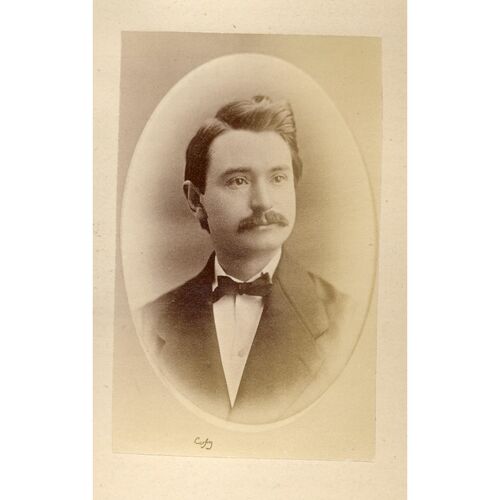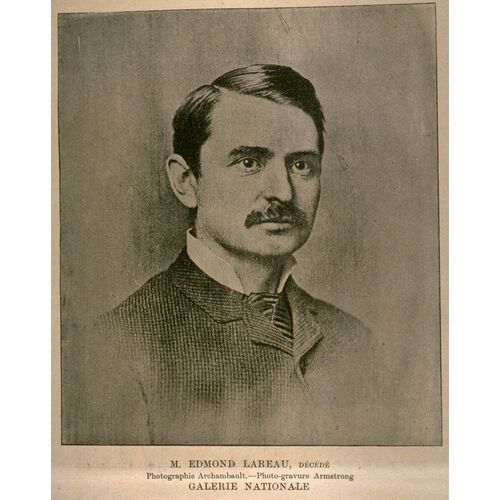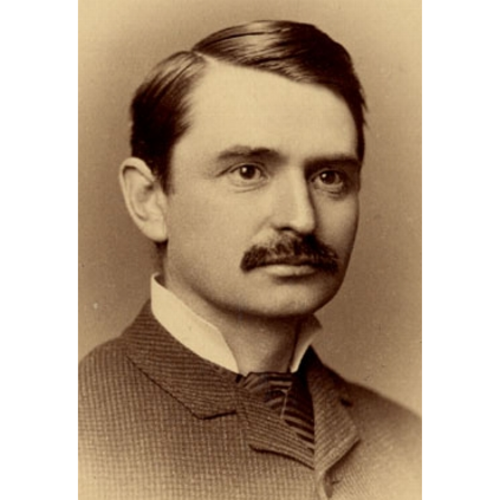LAREAU, EDMOND (baptized Pierre-Bénoni-Evremond), lawyer, teacher, author, journalist, and politician; b. 13 March 1848 at Mount Johnson (Mont-Saint-Grégoire), Canada East, son of Pierre-Bénoni Lareau and Odile Sylvestre; m. 9 Feb. 1880 Marguerite Robillard in Montreal, Que.; d. there 21 April 1890.
Edmond Lareau received his secondary education at the Collège Sainte-Marie-de-Monnoir and then studied at Victoria College in Cobourg, Ont., receiving a diploma of bachelor of law in 1870. In 1874, Lareau was granted a bachelor of civil law, ad eundem, in recognition of work he had done in civil law, by McGill College in Montreal, where in the same year he became a professor of law; he retained this position for the rest of his life. Admitted to the bar of the province of Quebec on 27 Sept. 1870, he practised as a lawyer in Montreal, particularly with Calixte Lebeuf, a Liberal sympathizer.
Lareau took an early interest in politics. In 1875 he became the first president of the Club National, an organ of the Quebec Liberal party [see Maurice Laframboise]; his lecture to the club on Libéraux et Conservateurs, in some measure complementing the famous speech on Canadian Liberalism made by Wilfrid Laurier* in 1877, attracted wide attention. In 1882 Lareau ran as a Liberal in the federal elections in Rouville, but was defeated by George-Auguste Gigault. The following year he successfully sued the newspaper La Minerve for libel during the election and won $600 in damages. Maintaining his association with the party organization, Lareau in 1883 became counsel for the Association Libérale de Montréal. Two years later, at the time of the Louis Riel affair, he was one of the 28 citizens who organized the great rally on the Champ de Mars in Montreal, a prelude to the formation of Honoré Mercier*’s Parti National. Lareau stood again in Rouville in the provincial elections of 1886 and this time was successful. During the three subsequent sessions in the Legislative Assembly of Quebec he argued for a pragmatic concept of liberalism. He often spoke in the house and his comments were greatly enriched by his legal knowledge.
In constitutional matters Lareau was a defender of provincial autonomy along the lines of Mercier; he commended the latter’s initiative in summoning the 1887 interprovincial conference, a gathering roundly condemned by Sir John A. Macdonald*’s party in Ottawa and the Conservative opposition in Quebec. He was especially in favour of transferring the federal fight of disallowance to London and he urged the necessity of increasing federal subsidies to the provinces to guarantee provincial autonomy. Also devoted to defending the rights of the English-speaking minority in Quebec, in 1887 he noted that the Quebec provincial boards of examiners favoured French Canadians in their tests for admission to study for the liberal professions by asking questions too closely related to the content taught in French institutions and failing to consider the different training given to English-speaking candidates.
In fiscal and commercial matters Lareau held classical liberal views. He particularly opposed a bill put forward in 1887 to institute an income tax to finance insane asylums, fearing that taxpayers would be forced to make a sworn declaration of their income. When a bill was introduced that year to abolish the right of municipalities to tax commercial travellers, Lareau gave it his support and delivered a lengthy speech in defence of freedom of business and the rights of the consumer. In his opinion this tax penalized consumers who were not near urban centres, since it encouraged commercial travellers to narrow their field of operation. He based his argument on Canadian case-law and the example of the Supreme Court of the United States, which had “just ruled in favour of commercial travellers.” As for another issue, Lareau favoured restricting the tax exemption of religious communities to the buildings where public services were dispensed without monetary gain; their other properties should be subject to the special tax for municipal services and calculated solely on the value of the land on which the edifice was built. In support of this view Lareau pointed to the fact that buildings belonging to a religious community “do not necessarily have a market value.” This opinion represented a middle ground between legislators committed to ultramontanism and the young Liberal intellectuals of Canada-Artistique (Montreal), who towards the end of the 1880s were expressing indignation at the tax exemptions accorded the church. Lareau also adopted an intermediary position on the condition of the working class. In 1887 he declared himself opposed to the complete abandonment of the right to garnishee wages: “It would be dangerous both for the supplier and for the worker. The former would be deprived of a serious moral guarantee for the money owed him. As to the latter, the very person you are trying to protect, you would be taking away his credit, which would be a grave step.” Hence Lareau proposed that a quarter of the pay should be liable to garnishment.
During his political career Lareau also gave his attention to journalism, contributing in the 1880s to a number of Liberal papers such as La Patrie and Le Temps, which was founded in Montreal by Honoré Mercier in 1883. In his articles Lareau gave evidence of openness of mind and of a moderation which contrasted with the anticlericalism of Benjamin Sulte* and Arthur Buies*. In La Patrie of 3 Jan. 1889 he observed of the United States: “In no country is the Roman Catholic religion more free. But this liberty given the Catholic faith is equally guaranteed by the constitution to all the others. The State is not sectarian: all men are equal before the law.” Nothing could better sum up his opinion about the relationships that the state should maintain with the various religious persuasions. Lareau also contributed to periodicals, and from 1875 regularly wrote articles on literature for the Revue canadienne. From 1884 to 1890, as a legal specialist, he was co-editor with John Sprott Archibald of the Lower Canada Jurist (Montreal), a vast compendium of judicial rulings issuing from courts having jurisdiction in civil matters in the province of Quebec.
Lareau produced two major works, a history of literature and a history of law. The Histoire de la littérature canadienne, which came out in 1874, is a veritable encyclopædia of letters, and more than a century after publication it is still being consulted. Lareau had a concept of literature that was unusually broad for his time; far from confining himself to the classic literary works, he also commented on journalism as well as writings on the law and natural science. How he managed to produce such a monument of erudition at an early age remains a mystery. In one 133-page chapter devoted to Canadian historiography he makes his philosophy of history clear. After a brief exposé of ancient and mediæval historiography from the works of Geoffroi de Villehardouin and Jean Froissart, he turns to a discussion of the “first glimmers of positivism”: “cold reason blazed the trail, trusting in its own strength: from then on humanity took a step in its forward march.” Both English- and French-speaking Canadian historians appear in this chapter, the author never questioning whether their works properly belong to the historical genre. Pierre Du Calvet* wins praise for his liberal ideas and Dr Jacques Labrie* is nicknamed the “Canadian Livy.” Michel Bibaud* is judged “inferior” to Jean-Baptiste-Antoine Ferland* as a “philosopher-historian,” to François-Xavier Garneau* as a “political historian,” and to Étienne-Michel Faillon* as a “narrator,” and he is said to “not follow, as [does] Garneau, the American social movement.”
Lareau also made a study of the broad syntheses developed by French Canadian historians in the mid 19th century. In accordance with his own ideological system, Lareau expressed a preference for the first edition of Garneau’s Histoire du Canada depuis sa découverte jusqu’à nos jours published in three volumes between 1845 and 1848 (there would eventually be seven more editions) as the version which readers were bound to prefer because of its advanced liberal views. This original edition, and in particular its first volume, had been attacked by the clerical-Conservative group, but Lareau nevertheless comments without rancour upon their condemnation. He prefers to give a context for Garneau’s later changes, suggesting that social forces obliged him to revise his original version “in order to make his book more acceptable to the majority of Canadian readers.” This concern for the relationship between the writer as producer and the reader as consumer more than once enabled Lareau to avoid making value judgements of the uncompromising and categorical kind so often found in the 19th century, when articulate analysis was overridden by dogmatism. Although he does not hesitate to acknowledge his preferences, he does so in a spirit of tolerance quite rare in his day. As an example, Lareau considers Faillon a historian who epitomizes belief in the workings of providence, who usually seeks “causes in supernatural or legendary explanations, neglecting natural or physical causes. . . . M. Faillon too often forsakes the real to take flight in the conjectural.” Here Lareau clearly shows his bias. But he concludes his assessment: “Consequently his history will have a more welcome place in the libraries of religious communities.”
Ever mindful of the readership for literary works, Lareau commented particularly on the writings of François Daniel and Louis-Philippe Turcotte*. Daniel’s Histoire des grandes familles françaises du Canada . . . (1867) is described as a “luxury volume intended to grace salons and libraries.” As for Turcotte’s Le Canada sous l’Union, 1841–1867 (1871–72), Lareau judges it a tool useful for men actively engaged in politics, or for young people contemplating a political career.
Despite the moderate tone of this history of Canadian literature, the clerical-Conservative faction did not spare Lareau. Just as they had with Garneau and Charles-Étienne Brasseur* de Bourbourg, the Conservative critics emphasized defects in his presentation in order to discredit the author and his ideas. Thus Narcisse-Henri-Édouard Faucher* de Saint-Maurice criticized him for inaccuracies, a lack of literary style, and an excess of typographical errors, in an attempt to condemn his liberalism more thoroughly. In 1879 critic Rémi Tremblay published under the pseudonym of Father Louison an eight-page pamphlet entitled Chansonnier politique du canard, avec musique, with a dialogue between master and pupil: the pupil is questioned about Lareau’s literary history in a sequence that brings out its grammatical errors. The critic concludes that “before writing one must learn to think, and . . . to constitute oneself the historian of a country’s literature, one must at least have some idea of spelling, style and grammar.” As Lareau’s friends recalled at the time of his death, the history of literature was a “sin of youth” which according to Faucher de Saint-Maurice he began to commit as soon as he left college.
Lareau’s second major work is undoubtedly his two-volume Histoire du droit canadien depuis les origines de la colonie jusqu’à nos jours, published in 1888 and 1889. In 1872 with Gonzalve Doutre*, Lareau had produced a similar synthesis which went up to 1791 and was primarily designed as a more or less methodical compilation of facts. This second attempt proved a much more thorough study and remains a classic of Canadian historiography which is still frequently consulted for its scientific value. In the first volume the author deals with the period of the French régime, and in the second with that of the English régime up to 1887. He seldom lets his ideological perspectives distort the scientific exposition of his subject. It is true that Lareau, who admired British liberties, trial by jury, and laissez-faire economic policies, did not fail to contrast New England in its rapid progress with a New France stifled in its development by the absolutism of the state and an autocratic system of criminal justice. But the author does not hesitate to use more objective factors to explain the economic stagnation of New France, for example the absence of specie and the deficit in the balance of trade. He also weighs his judgement carefully when dealing with the seigneurial régime. In discussing the relations between church and state in New France, however, Lareau reveals his ideology more explicitly. Those who followed the example of Governor Frontenac [Buade*] and wanted to ensure the supremacy of the state over the church, or to set up mechanisms for popular consultation such as the convocation of the states general, win the historian’s admiration, whereas Bishop François de Laval* is judged severely for having supposedly exceeded his authority. To make this point, Lareau conjures up the image of a dominating, absolutist bishop, thus coming close to Garneau’s interpretation in his first edition of the Histoire. Garneau is moreover not the only liberal writer upon whom Lareau draws. Contrary to the predominant historiography of the second half of the 19th century, Lareau on occasion makes use of the views of abbés Guillaume Raynal and Brasseur de Bourbourg.
The volume devoted to the British régime is freer from ideological discussions. Less nationalistic than Garneau or Sulte, Lareau describes the development of the political and constitutional structure of Canada, drawing on the work of Théophile-Pierre Bédard and Louis-Philippe Turcotte. In this section the legal historian also takes the opportunity to come to the defence of lawyers. He indignantly rejects the epithet of “vermin” which Lahontan [Lom*] bestowed on them. Lareau, who according to La Patrie was a lawyer with a large practice, enlivens his remarks with a slight touch of corporatism. Thanks to the law, “the weak find protection against the encroachments of the strong”; the lawyer “has fought against all those who sought to make one man the slave of another. . . . He has done more for the human race than all the philosophical sects put together.”
This history by Lareau was not, however, entirely to the liking of the clerical Conservatives. Thomas-Étienne Hamel, a critic of the journal Le Canada-français (Quebec), reproached him for his “prejudices” concerning the status of the church and for his effort to ridicule certain persons and certain questions such as the quarrel over precedence or the discussion to determine whether the tithe was a matter of divine or positive law. But it is none the less true that Lareau gave evidence of a critical spirit that was well above the level usual in 19th-century Quebec.
Throughout his career Lareau never betrayed the ideas defended in his articles or books, with the result that he was not afraid to show his independence towards the “Mercierist” coalition when, beginning in 1889, doubt was cast upon the government’s integrity in questions involving corruption and fraud. By his legal, historical, and literary works, Edmond Lareau belonged clearly to the liberal element of his generation, at least to the extent that this group was committed to freedom of thought as against an ultraconservative attitude of the ultramontane type. Nevertheless, his thinking was never doctrinaire, and he maintained a tolerant attitude towards ideologies opposed to his own.
[Edmond Lareau was the author of the following works in law, history, and literature: Tableau des délais fixes contenus dans le Code civil, le Code de procédure civile, les règles de pratique et l’acte de faillite, 1869 (Montréal, 1870); Le droit civil canadien suivant l’ordre établi par les codes, précédé d’une histoire générale du droit canadien (Montréal, 1872), which he wrote with Gonzalve Doutre; Hist. de la littérature canadienne; Mélanges historiques et littéraires (Montréal, 1877); Libéraux et Conservateurs (Montréal, 1879); Réformes judiciaires: examen du rapport de la commission de codification des statuts (Montréal, 1882); Histoire abrégée de la littérature (Montréal, 1884); Le Code civil du Bas-Canada (Montréal, 1885); and Histoire du droit canadien depuis les origines de la colonie jusqu’à nos jours (2v., Montréal, 1888–89). He also wrote articles for the Rev. canadienne, to which he contributed regularly as early as 1875. s.g.]
Débats de la législature provinciale (G.-A. Desjardins et al.), IX: 533–36, 629–30, 695–97, 813–15, 1113–16. Le Canadien, 6 nov. 1889, 23 avril 1890. Beaulieu et J. Hamelin, La presse québécoise, I–III. Borthwick, Hist. and biog. gazetteer, 150. CPC, 1889: 262. DOLQ, I: 316–18, 362–64, 472–73. Dominion annual register, 1882–84. Marguerite Gauthier, “Bibliographie d’Edmond Lareau” (thèse de des, univ. de Montréal, 1943). Le Jeune, Dictionnaire, II: 74. Serge Gagnon, Le Québec et ses historiens de 1840 à 1920: la Nouvelle-France de Garneau à Groulx (Québec, 1978). Rumilly, Hist. de la prov. de Québec, VI. É.-Z. Massicotte, “Notes généalogiques et bibliographiques sur Edmond Lareau,” BRH, 29 (1923): 69–72.
Cite This Article
Serge Gagnon, “LAREAU, EDMOND (baptized Pierre-Bénoni-Evremond),” in Dictionary of Canadian Biography, vol. 11, University of Toronto/Université Laval, 2003–, accessed December 29, 2025, https://www.biographi.ca/en/bio/lareau_edmond_11E.html.
The citation above shows the format for footnotes and endnotes according to the Chicago manual of style (16th edition). Information to be used in other citation formats:
| Permalink: | https://www.biographi.ca/en/bio/lareau_edmond_11E.html |
| Author of Article: | Serge Gagnon |
| Title of Article: | LAREAU, EDMOND (baptized Pierre-Bénoni-Evremond) |
| Publication Name: | Dictionary of Canadian Biography, vol. 11 |
| Publisher: | University of Toronto/Université Laval |
| Year of publication: | 1982 |
| Year of revision: | 1982 |
| Access Date: | December 29, 2025 |


![M. Edmond Lareau, décédé [image fixe] / L.-G.-H. Archambault et Armstrong Original title: M. Edmond Lareau, décédé [image fixe] / L.-G.-H. Archambault et Armstrong](/bioimages/w600.4811.jpg)



